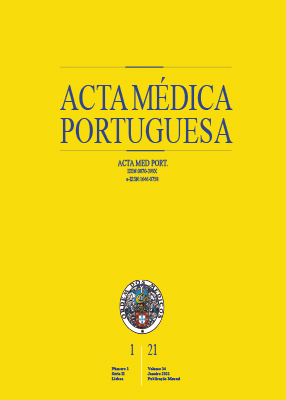The Burden of Post-Thrombotic Syndrome in a Long-Term Retrospective Cohort in Northern Portugal
DOI:
https://doi.org/10.20344/amp.13567Keywords:
Postthrombotic Syndrome, Quality of Life, Venous InsufficiencyAbstract
Introduction: Post-thrombotic syndrome is a frequent and disabling complication of deep venous thrombosis. Its incidence is not described in the Portuguese population. The objective of this study is to report the incidence and severity of post-thrombotic syndrome after the initial episode of deep venous thrombosis.
Material and Methods: This is an observational, unicentric, retrospective cohort of patients who had a first episode of deep venous thrombosis in the lower limb, documented with duplex ultrasound (n = 101). The modified Villalta score was applied by phone interview for the diagnosis and staging of post-thrombotic syndrome. The quality of life of patients was measured with the modified CIVIQ 14 classification.
Results: Median follow-up time was six years (interquartile range 1). Severe post-thrombotic syndrome was present in 27% of patients and moderate in 33%. Performing physical activity at the time of the interview was associated with lower incidence of post-thrombotic syndrome (relative risk 0.489; 95% confidence interval = 0.320 - 0.748). Body weight gain after deep venous thrombosis (relative risk 2.188; 95% confidence interval 1.137 - 4.210) and lower education levels (relative risk 2.005; 95% confidence interval 1.297 - 3.098) were associated positively with post-thrombotic syndrome. Quality of life was 90 ± 17 vs 64 ± 18 vs 43 ± 15 in patients without postthrombotic syndrome, with moderate post-thrombotic syndrome and with severe post-thrombotic syndrome, respectively (p < 0.001).
Discussion: The long-term incidence of post-thrombotic syndrome in a cohort of patients from Northern Portugal is higher than in other studies and correlates with worse adjusted CIVIQ-14 scores.
Conclusion: Large studies of prospective nature could provide more definitive evidence.
Downloads
Published
How to Cite
Issue
Section
License
All the articles published in the AMP are open access and comply with the requirements of funding agencies or academic institutions. The AMP is governed by the terms of the Creative Commons ‘Attribution – Non-Commercial Use - (CC-BY-NC)’ license, regarding the use by third parties.
It is the author’s responsibility to obtain approval for the reproduction of figures, tables, etc. from other publications.
Upon acceptance of an article for publication, the authors will be asked to complete the ICMJE “Copyright Liability and Copyright Sharing Statement “(http://www.actamedicaportuguesa.com/info/AMP-NormasPublicacao.pdf) and the “Declaration of Potential Conflicts of Interest” (http:// www.icmje.org/conflicts-of-interest). An e-mail will be sent to the corresponding author to acknowledge receipt of the manuscript.
After publication, the authors are authorised to make their articles available in repositories of their institutions of origin, as long as they always mention where they were published and according to the Creative Commons license.









